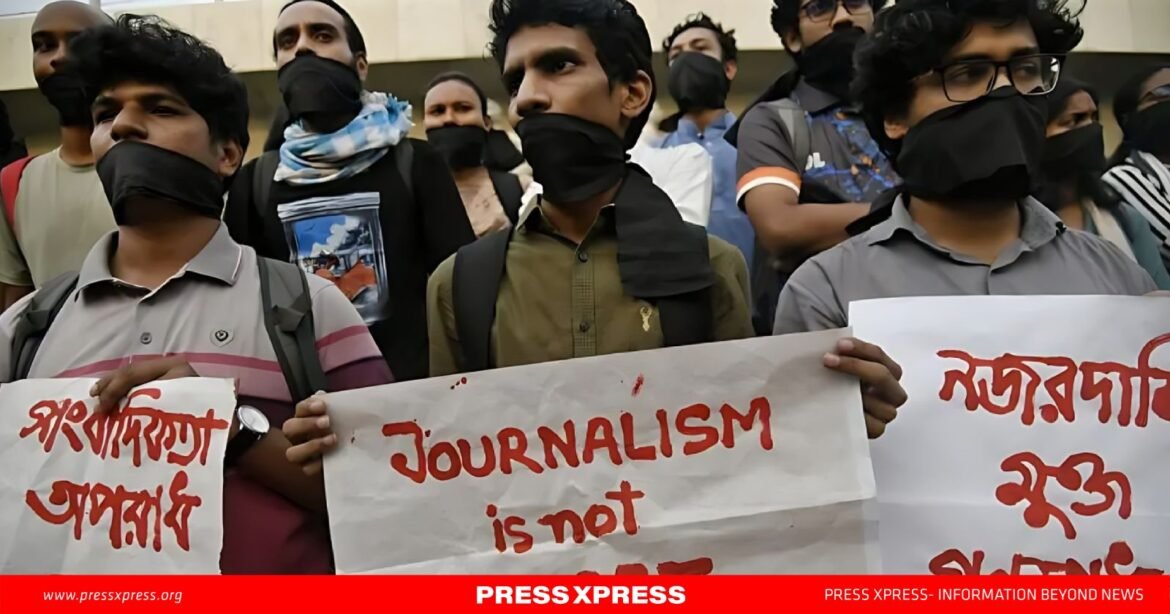Rights groups and journalist associations have condemned Bangladesh’s interim government for canceling the press accreditations of 167 journalists in a series of recent actions, calling it a major threat to press freedom. The cancellations, carried out by the Press Information Department (PID) between October 29 and November 7, have raised widespread concerns about media independence under the new leadership of Nobel laureate Muhammad Yunus.
The Editors’ Council, an association representing senior editors and journalists, voiced strong opposition to the move, warning that it risks creating “a climate of control, including censorship, over the media.” According to the Council, while officials can review misuse of accreditation, revoking credentials without specific allegations and evidence undermines press freedom.
The revocation notices from the PID referenced the 2022 Press Accreditation Policy but did not specify reasons. Journalists affected by the cancellation, including those perceived as critical of the government, now face restricted access to government ministries, which limits their ability to report on official events and press conferences. This restriction has already impacted reporting; an Associated Press (AP) journalist was among those stripped of accreditation. In response, AP Executive Editor Julie Pace condemned the decision, urging the government to restore credentials immediately.
Reporters Without Borders described the decision as “incomprehensible,” especially as it followed the Information Ministry’s recent formation of a committee to address harassment of journalists. The media watchdog warned that the move fosters self-censorship and further limits press freedom. Transparency International Bangladesh also criticized the revocations, citing them as evidence of “an anti-people authoritarian regime.”
The interim government, led by Yunus since August, had previously vowed to support democratic values and press freedom. Yunus himself emphasized the importance of a free press in a recent interview with Prothom Alo, one of Bangladesh’s largest newspapers, saying, “Write as you please. Criticize. Unless you write, how will we know what is happening or not happening?” However, concerns have mounted as reports of journalist harassment and intimidation persist. Since August, at least 25 journalists have been charged with alleged violence related to the protests, according to Reporters Without Borders.
In August, Human Rights Watch also condemned the arrest of two journalists, warning that the justice system was showing signs of partisan behavior and failing to observe due process.
These concerns echo those raised in a recent U.S. State Department briefing, where spokesperson Vedant Patel addressed questions from Dastagir Jahangir, USA Bureau Chief of Press Xpress, on the press accreditation issue. Patel affirmed the U.S. government’s “strong point of view” on press freedom, calling it “vital” for reporting on current events, including those in Bangladesh. While Patel had not confirmed the specific reports, he stated that, if true, such restrictions would be “unfortunate,” adding that the U.S. remains committed to ensuring that journalists in Bangladesh can operate freely and securely.
The latest revocation order, signed on November 7 by Chief Information Officer Md Nizamul Kabir of the PID, highlights the government’s intent to enforce strict media policies. The order came after two previous rounds of revocations, affecting a total of 167 journalists. According to the Dhaka Tribune, the interim government’s actions are part of a broader push to grant press credentials only to those meeting specific standards, as outlined in the Press Accreditation Policy-2022.


